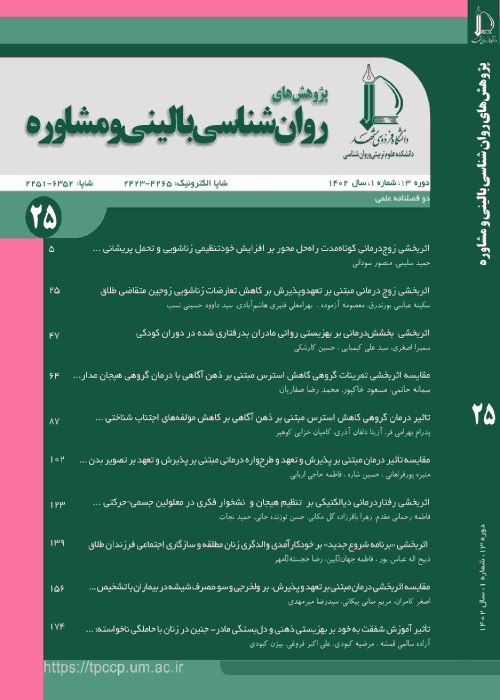The Impact of Mindfulness-Based Stress Reduction Group Therapy on Reducing the Components of Cognitive-Behavioral Avoidance in Male Adolescents with Oppositional Defiant Disorder
About 2 to 16 percent of children and adolescents suffer from oppositional defiant disorder (Nazario, 2020), which is associated with symptoms such as frequent and ongoing pattern of anger, arguing and defiance toward others, conflict, nervous mood, irritability, rebelliousness, and malice. The mentioned symptoms must exist in four ways to confirm the diagnosis of this disorder: 1) at least it has occurred to a person other than a sibling; 2) causes significant problems at work, school, or home, 3) is accompanied by other behavioral disorders such as substance abuse, depression or bipolar disorder; 4) lasts at least once a week for 6 months (Payne, 2022).One of the psychological mechanisms used by adolescents with oppositional defiant disorder is avoidance. Avoidance occurs in cognitive-behavioral dimensions and causes failure in finding an appropriate response to emotional stimuli and weakens emotion management. Persistence of problems such as malice, harmful and antisocial behaviors, drug abuse, suicide, depression, anxiety, and so on aramong the disadvantages of using cognitive behavioral avoidance. Therefore, it is crucial to find effective coping methods to reduce this psychological mechanism in adolescents with oppositional defiant disorder.Some methods of psychotherapies have been used to treat oppositional defiant disorder, individually or in groups (Shahmardi, 2021). For example, Muratori et al. (2021) investigated the effectiveness of mindfulness-based group therapy in people with confrontational disobedience, however; they examined the effectiveness on a non-adolecent sample suffering from hyperactivity symptoms. Considering related studies and research gaps, the aim of this study is examining the effectiveness of mindfulness-based stress reduction group therapy on reducing cognitive-behavioral avoidance components in adolescents with oppositional defiant disorder.
The statistical population of this semi-experimental research consisted of all male students with oppositional defiant disorder. The sample consisted of 40 male students who, based on the diagnosis of regional counseling center specialists, showed cognitive avoidance syndrome. The criteria for being included in this research were: not having any other physical or neurological disease, not being under any medication or psychotherapy, and agreeing to participate in the research. These participants were purposefully selected and then randomly divided into experimental and control groups (20 people in each group). Mindfulness-based stress reduction group therapy was performed for the experimental group over 8 weeks, once a week, 40 minutes each time. However, the control group did not receive any intervention. Participants were asked to complete the Cognitive Behavioral Avoidance Questionnaire of Sexton and Dugas (2008) in the pre-test and post-test phases. The data were analyzed through multivariate analysis of covariance method (MANCOVA).
The results showed that compared to the control group, participants in the experimental group showed lower scores in the subscales of replacing disturbing thinking with positive thinking, returning attention to interrupt the process of worry (distraction), and changing mental images to verbal thinking in the post-test measurment. These results indicate that mindfulness-based stress reduction group therapy is an effective intervention in reducing cognitive behavioral avoidance components including replacing disturbing thinking with positive thinking, returning attention to interrupt the process of worry (distraction), and changing mental images to verbal thinking.
The combination of techniques and skills used in the method of reducing stress based on mindfulness with the advantages of group therapy resulted in the finding that this therapeutic method can reduce cognitive behavioral avoidance and its components in adolescents with oppositional defiant disorder. Therefore, the mindfulness-based stress reduction group therapy can be used as a suitable method for adolescents to enjoy the benefits of reducing the components of cognitive behavioral avoidance such as appropriate response to emotions, managing emotions, reducing stress, anxiety and other negative psychological effects caused by confrontational disobedience.
- حق عضویت دریافتی صرف حمایت از نشریات عضو و نگهداری، تکمیل و توسعه مگیران میشود.
- پرداخت حق اشتراک و دانلود مقالات اجازه بازنشر آن در سایر رسانههای چاپی و دیجیتال را به کاربر نمیدهد.


